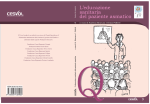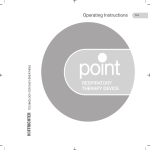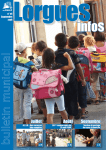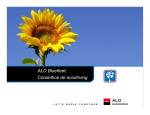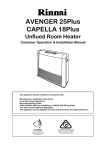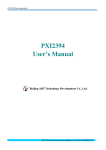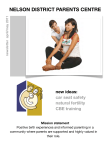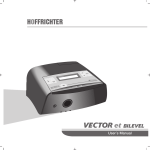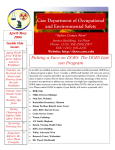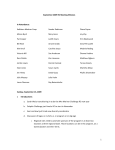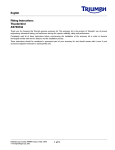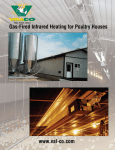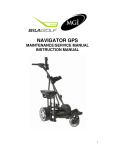Download Guide for Adults with CF - Cystic Fibrosis Association of New Zealand
Transcript
A Guide for Adults with Cystic Fibrosis Cystic Fibrosis Association of New Zealand Contents Introduction CFANZ – Introduction to the Association Staff list Services that CFANZ provide Your physical wellbeing: Talking to your Doctor, physiotherapy, eating well Your lifestyle: Creating a healthy home, travel, employment Your emotional wellbeing: Sexual Health and Sexuality, Becoming Independent and managing change 2 Introduction Welcome to the Cystic Fibrosis Association Adult Guide. Life with CF has many challenges and plans that need special consideration. We hope that in this guide, we have provided some insight about how to get the most out of life, remain independent and healthy, as active managers of your Cystic Fibrosis journey. The Cystic Fibrosis Association of New Zealand has been assisting people with CF and their families since 1968. We provide a wide variety of supports for individuals and families through: Education Financial Support Emotional Support Social Work and Counselling Research The Association has a national office in Christchurch and 12 active branches around the country. The National Office has 6 staff, including two Regional Field Workers. Staff Contacts Chief Executive – Kate Russell Email: [email protected] or phone (0800) 65 1122 Mob (021) 452 831 Administration Manager – Julie Clemett Email: [email protected] or phone (0800) 65 1122 Fundraiser and Event Co-ordinator – Caroline Wagteveld Email: [email protected] or phone (0800) 65 1122 Northern Region Field Worker – Sally Carron (hours: Tuesday – Friday 9am – 4.30pm) Email: [email protected] or phone (09) 636 0351 Mob: 021 126 1237 Southern Region Field Worker – Susan Lovelock (hours: Monday, Thursday, Friday 9.15am – 4.30pm) Email: [email protected] or phone (0800) 65 1122 Mob: 021 0222 1203 3 Specific Services of the Cystic Fibrosis Association of NZ 1. Information The Association is the only dedicated source of information on Cystic Fibrosis in New Zealand. We have comprehensive information about the clinical, psychological and emotional aspects of living with CF. The National Library held at the National Office in Christchurch contains books, videos, DVDs and sound recordings on a number of CF-related subjects, including: clinical aspects, lung transplantation, family and emotional challenges, inspiring real-life stories and research articles. All publications are available for loan for 1 month and a full catalogue is available from the Association website at www.cfnz.org.nz 2. Education The Association aims to educate and empower families and adults with CF, to become good self-managers and promote a high level of knowledge within the CF Community, about the clinical aspects of the condition. We do this through our Field Workers, periodic workshops, education sessions and our Annual National Conference. 3. Conference The National Conference is held in May of each year and attendance is free for all adults with CF (who meet our cross-infection policy outlined below) The Association waives registration costs for adults who wish to come and learn more about living positively with CF (travel and accommodation costs have to be met by the individual but in many cases, your branch will be able to assist you). There is an expectation that those who are funded to attend will maintain good attendance at all pertinent sessions. The conference is advertised from early in the year, on the CFANZ website at www.Cfnz.org.nz and in the national magazine “CF News”. Registration forms, programmes and other updates are also sent to your local branch Chairperson, so keep in touch with them if you want updates on the coming event. Our Cross Infection Policy for adults with CF attending the national conference is strictly adhered to and copies of this can be obtained from the National Office. 4. Field Worker Services The Association has two Regional Field Workers, who provide advocacy, advice and assistance with life planning within their regions. They work closely with adults with CF on all aspects of the condition and can provide sound advice and assistance with navigating the Association’s services and those of WINZ, Ministry of Health and other government agencies. In many instances, we ask that you go through your local Field Worker to access the supports we offer, so that these can be properly assessed and we can make sure the right people are helping you at any given time. 4 Services and Agencies we work with Through WINZ, you may be entitled to one or some of the following financial supports Invalids’ Benefit Training Incentive Allowance Accommodation Supplement Through the Ministry of Health (and your local District Health Board) you may be eligible for assistance with travel costs if you are attending a clinic that is a long distance from your home, under their travel allowance policy. Your Field Worker can advise you about the process for this. The Cystic Fibrosis Association Adult Representative The Association appoints an Adult Representative to the National Board each year and this person works to bring adult issues to the board table and add the “adult with CF” voice to policy decisions and service development. The Adult Representative also: Takes part in policy planning from the viewpoint of how that policy affects Adults with CF Brings concerns and priorities of the adult CF community to the Board table through regular consultation with the Adult group Acts as a conduit between the Board and the adult CF community, relaying pertinent information between the two For contact information for the Adult Representative, visit the CFANZ website on www.Cfnz.org.nz 5 CFANZ Grants and Assistance Schemes The Association provides a number of grants and allowances to assist people with Cystic Fibrosis and their families. In the main, these grants are available upon consultation with your Field Worker – they will be able to advise what is available to you in each situation. Hospital Allowance This allowance is available to any person with CF who is hospitalised 100kms or more from their home (for CF-related illness). An allowance of $20 per day is payable directly to the PWCF, up to a maximum of 14 days. Application forms are held at all clinics and are also available from your field worker or from the grants section of the CFANZ website at www.cfnz.org.nz . Forms must be signed by a health professional recognised by the CF Association to verify your inpatient status and the length of stay. Local Voucher Scheme This is a needs-assessed support scheme to provide vouchers to inpatients for extra food or petrol (if needed) during in-patient stays. These vouchers are provided by each local branch and are held at the clinic. If you feel you might need this service, please contact your Field Worker. National Voucher Scheme This is a needs-assessed support scheme to assist people with CF with the extra costs that are sometimes incurred when on Home IV Therapy. Costs such as food and petrol will be assessed to see if support is appropriate. Again, if you feel you are in need of some support, please speak to your Field Worker Chris Howlett Endowment This is an unconditional gift of $1700.00 from the Association, for PWCF in New Zealand when they turn 18 (conditions apply). You must register for this payment BEFORE your 19th birthday. Please contact the national office for the forms or they can be downloaded from the CFANZ website www.cfnz.org.nz This gift is possible due to a legacy left to the Association by the family of Chris Howlett a person with CF, for whom a large fundraising campaign was undertaken in the early 1990’s for a transplant (this was before transplants were performed in NZ) Sadly, Chris passed away before he could receive his new lungs so his family gifted the fundraised money to the Association to give a gift to each PWCF when they become an adult. 6 Tertiary Study Assistance The CFANZ Tertiary Study Assistance is designed to assist you with the costs of attaining a first level tertiary qualification or trade at an NZQA-approved provider. For people with CF who do not qualify for the WINZ Training Incentive Allowance through their Invalid’s Benefit, we recognise that there are many costs in attending tertiary study and training. The Association aims to make things a little bit easier by making a contribution toward those costs. The scheme is not designed to pay all your costs, but rather, provide a ‘hand –up’ to people with CF who wish to pursue further study, who cannot receive assistance from Work and Income NZ. WINZ should always be the first port of call for those seeking assistance with their study. Our Field Workers are here to help you to navigate the WINZ application systems for Invalids Benefits and the Training Incentive Allowance, although there are strict restrictions on this and it is limited to those studying in courses that are NZQA level 3 and below, which precludes most university and polytechnic study. If you DO qualify for our help, here’s how the CFANZ scheme works: PWCF may apply to CFANZ for up to 50% of the course costs of tertiary study up to a maximum of $2,500 per year. To qualify you must meet the following criteria: Be in an NZQA approved course Not be repeating papers or sections of a course that has already been funded in previous years Not qualify for WINZ Training Incentive Allowance Study must be in an undergraduate course or equivalent, an apprenticeship or trade course (Post-graduate study will not be funded) If you think you may qualify for assistance with your Tertiary Study fees from the Cystic Fibrosis Association, please contact your local CF Field Worker for advice and guidance about how to apply. For further information you can visit www.cfnz.org.nz and go to the Grants & Awards page. 7 Breath4CF Grants This is an annual grant given to all people with CF to assist with the costs of maintaining a physically active lifestyle. The general aim of the fund is to help with exercise costs with a $300 grant available per annum to all adults with CF. The following is a list of some of the activities covered by this fund. It is by no means exhaustive and if in doubt please call the National Office to check if your chosen activity is eligible. Team or individual sports Equipment Horse riding Sports Club fees, training or sporting lessons Singing lessons Swimming lessons Trampolines Gym memberships Individual sports Sporting trips to competitions WII Fit systems Activities which will not be considered: Social gatherings or sports trips which are predominantly social in nature Holidays (individual or family) Clothing classed as non-essential, which includes any clothing that is not activity-specific. Computer games, X Box or Playstations If you have any further queries or need assistance in filling in this form, please contact the Administration Manager at the Cystic Fibrosis Association of New Zealand National Office CFANZ Emergency Welfare Fund Both the CFANZ Field Workers have the ability, in cases of extreme hardship, to access our emergency welfare fund for individual need. This assistance is needs-assessed and has to be related to the impact of Cystic Fibrosis on the individual or family. If you are experiencing hardship due to your condition, speak to your Field Worker, or to the Administration Manager or Chief Executive at the National Office. 8 Your Physical Wellbeing You can make all the plans in the WORLD but it all depends on how well your body is and whether or not you are in the best shape you CAN be to take on all the challenges life throws at you. In this section, we look at the essentials for a healthy CF body. 9 Communication with your Health Professional Team People with Cystic Fibrosis are very reliant on their clinical team to help them to stay well and to care for them during times of sickness. Many people with CF build a very close relationship with their hospital team over a number of years. Communication is the most vital element in developing a great relationship over time; be it with family, friends or those who can provide you with care and advice for your specific health needs. Therefore, maintaining open and clear lines of communication with Doctors, Nurses, Dietitians, Psychosocial Workers and Physiotherapists is a vital element of great management of CF. Being honest with your Doctor about how you are feeling, any symptoms or changes you have been experiencing or anything new, will help them to determine the best treatment for your unique case. Remember, everyone with CF is different. If you wish to be treated as an individual and not a number, then telling your care team about your particular symptoms and health issues is a vital part of the puzzle! Being able to track and recognise new or different symptoms such as ‘is my cough getting worse?’ or ‘has my appetite decreased?’ is very important for people with CF. Take the time to get to know your own body and any patterns that you have seen develop when you are getting sick so that you can act quickly and get on top of any infections before they become serious. Part of this self-knowledge, is knowing when to seek help. If you notice changes in your health, you are far better to act early, be seen at your clinic and determine if treatment is necessary than to wait until you are very sick, by which time, damage to your lungs may have already been done. Taking care of yourself with CF is very much like driving a car – If you ignore the warning signs, you may end up in a very serious situation! The role of the General Practitioner In many cases, people with CF do not get treatment for their condition from their GP (though in some regions of NZ the GP is your first port of call for CF care), but it is very useful to maintain a close relationship with your Primary Healthcare Provider so that your GP is aware and supportive of your treatment regime. Take the time to educate and upskill your GP and his/her practice about your Cystic Fibrosis. In that way, they will be better placed to support you and to take other health concerns you may have, in the context of your CF. If you would like us to send your GP some information about CF, contact our Administration Team. 10 Patient as Expert A lot has been said recently about ‘patients as experts’. It is now widely recognised that in many cases, where people with a chronic illness have a high level of self-awareness and knowledge about their own condition, they are in fact, the best people to be able to manage their illness on a day to day basis and can provide important ‘intelligence’ to their care teams about how they are feeling, changing symptoms and what they feel will help them the most. One of the best ways to become a great ‘ expert’ on your own health, is to maintain a diary or notebook of your symptoms over time and to record any questions or comments you want to present to your care team, when you see them at clinic. This is a great way for you to track your progress over time and make sure you don’t miss out on questions that are important to you, because you forget to ask them during the busy time at clinic. Your notebook might include sections on: My FEV1 (lung function) My weight or BMI (you might even put in a graph!) How much am I coughing? Physio diary (including documenting anything that works really well) What meds am I on currently? My allergies How am I feeling generally? Questions I have for the next clinic Suggestions I have for the ward Any concerns I have Things I want to work on (Goals for BMI/ FEV/sporting goals/ life goals that have a CF component to make them work) Maintaining a simple diary such as this will enable you to ask all the questions you have and keep a record of answers to refer to later. It also helps you to track how you are doing over time and keep a handle on anything you need to pay special attention to. 11 Physiotherapy AIRWAY CLEARANCE As an adult with CF you will be aware of the benefits of your airway clearance regime (chest physiotherapy ) and the importance of actually doing it. The aim, in the short term is to reduce airway obstruction, so that your breathing becomes easier. Long term, the removal of secretions may help to reduce damage to the airways helping to maintain lung function. It is best done regularly when well and more frequently when unwell or taking antibiotics. When did you last discuss your airway clearance with a physiotherapist ? Have you had your airway clearance technique checked recently ? ( it’s easy to get rusty or develop bad habits) Do you want to learn about other techniques ? Do you want to be independent of a helper ? Are you finding that what once worked, is now not fitting in with your new lifestyle? Have you checked that you are co-ordinating the nebuliser treatments correctly ? Talk to the physiotherapist at clinic or make an appointment to see a respiratory physiotherapist at your local hospital. There is always something to learn and every effort is made to individualise a regime according to your preferences EXERCISE The importance of exercise in maintaining a healthy lifestyle is well-recognised both in health and disease. Short-term studies of exercise training programmes in Cystic Fibrosis have been shown to have considerable therapeutic benefit and the majority of people wish to include it in their routine self care. (Clinical Guidelines for the physiotherapy management of Cystic Fibrosis U.K.) Exercise is the cornerstone of therapy for people with CF. Aerobic fitness is an independent predictor of survival and those with better physical fitness have a better quality of life (Australian Standards of Care) Statements such as these were the driving force behind the Breath 4 CF programme. Have you used your grant for this year yet? Don’t forget, you are eligible for this EVERY year. Consider the following when designing a programme (discuss with a physiotherapist and /or trainer): Everyone with CF can exercise. Those with mild to moderate disease can exercise at the same level as their peers while those with more severe disease may require assessment by a physiotherapist. (Clinical Guidelines for the physiotherapy management of Cystic Fibrosis, CF Trust U.K.) Aerobic exercise prescription should follow the same principles as those used in healthy individuals – exercise at least 3 days a week, duration of 30 minutes per session or shorter intervals if required and an increase in heart rate of approximinately75% of maximal heart rate is safe and beneficial during exercise (Australian CF Guidelines) 12 An exercise programme should consist of an aerobic component, activities to enhance muscular strength and flexibility for the upper and lower body. Weight bearing exercises may be useful to delay the loss of bone mineral density. Remember that a good exercise habit is dependent on routine, realistic goals and doing something that you really enjoy ( variety will challenge the boredom) Planning a marathon (or half) – if new territory for you discuss strategies with your dietitian as well as your trainer. Exercise must be tailored to the individual “ Breathlessness without distress “ A WORD ABOUT GYMNASIUMS A regular routine is the key to maintaining an exercise programme Gyms are excellent as they are available whatever the weather – but maybe your choice is only when outdoors is not suitable Remember to include in your gym kit a towel, appropriate clothing and footwear, a drink bottle and your reliever inhaler if you use one. Wash your hands before and after the session and you can use a bacterial spray to wipe down equipment. Disclose any relevant health information to your trainer. They are there to help, so honesty is the best plan. TIPS FOR YOUR TRAINER Cystic Fibrosis is an hereditary disease that affects mainly the lungs and digestive system. Because of the nature of the disease, it is particularly important for the person with CF (PWCF) to remain active. The main focus is to keep the mucus produced in the lungs moving and increase lung capacity. The best way to do this is through moderate to high intensity cardio workouts as well as resistance training. Take the following into consideration when designing a programme: Retaining weight is a problem for most PWCF, so the workout can be shorter, but Physiotherapy + exercise x regularity of higher intensity - more anaerobic than aerobic. = CF adults will often have reduced lung volume, so start off easy and build on the More time for you, your family, work intensity of the programme over time. and play Resting heart rates are generally higher than normal, so be aware of this on the You have the formula, now it’s up to machines. you Strengthening the muscles in the chest will help with lung function and breathing. Exercises such as Pec Flys will enhance the strength component as well as stretching the chest muscles. The upper back muscles are also helpful in improving posture and breathing. CF tends to make the chest tight, so adults often start to slouch as they get older. Exercises such as the Seated Row and Upright Row will be helpful. Keep repetitions higher to work more on muscle endurance: 10-15 repetitions is good. 13 Eating well Like physiotherapy, by the time you get to be an adult with CF, the need to maintain a good body weight (lean body mass) is something you will have heard over and over again. Diet definitely does matter. Achieving and maintaining a good weight is essential for maintaining good lung function, helping you to withstand infection and is associated with improved outcomes. Dietary requirements vary considerably and whilst some people may have normal energy requirements, most people with Cystic Fibrosis (CF) have higher energy needs than people without CF, because they do not absorb their food as easily. As a general principle, people with CF often require 20 to 50% more calories each day than people without CF however some may need considerably more than this. For this reason we usually encourage you to have a high calorie diet. This high calorie intake is often hard to achieve as many people with CF experience reduced appetite, especially during episodes of infection – the very time when your body’s energy requirements are at their highest. At the same time many people with CF need to take enzymes to digest and absorb fat-containing foods. Forgetting to take or taking too few enzymes will result in some fat being wasted and you will lose fat (energy) in your stools. This can lead to weight loss or difficulty in gaining weight despite eating well. Even if you are taking your enzymes appropriately you will continue to lose some fat in your stools and this contributes to your increased energy requirements. The question many people with CF ask their care teams, when given the regimes they need to stay well is: “Why do I NEED to do what I am told I SHOULD do”? In the case of maintaining a good body weight, the answer is very simple. If you want to stay well for longer and you want to stay out of hospital, then work at keeping up your weight so that your body can fight off the infections that are bound to hit you from time to time. Your Dietitian will give you practical help and advice on achieving and maintaining your ideal weight. This may involve using supplements and/or tube feeding. If you require pancreatic enzymes, a Dietitian will advise you regarding dose adjustment and timing with foods. It is therefore important to see your Dietitian regularly, ideally at each clinic visit. 14 A WORD ABOUT CF-RELATED DIABETES (CFRD) Diabetes is common in adults and adolescents with Cystic Fibrosis. It occurs in approximately 30% of people with CF by the age of 25 years. Cystic Fibrosis related Diabetes (CFRD) is less common in children. What is Diabetes? Diabetes is a condition where the amount of glucose (sugar) in the blood is too high. Normally a hormone called insulin controls the amount of glucose (sugar) in our blood. Insulin is needed to move glucose from the blood stream into the cells. In diabetes the pancreas does not produce enough insulin and the insulin produced does not work properly. When people talk about blood glucose or blood sugars they mean the same thing and often use the terms interchangeably. Why is Cystic Fibrosis associated with Diabetes? It is well known that in most people with CF the pancreas does not work properly. This results in two important medical problems. Firstly, the pancreas is unable to produce enough digestive enzymes or juices, which break down foods such as carbohydrate, proteins and fats so that they can be absorbed in the gut. This is why most people with CF have to take additional enzymes with food and snacks containing fat. Secondly, the pancreas can stop producing enough insulin and this can result in CF related Diabetes. Cystic Fibrosis related Diabetes is different from the two main types of Diabetes (Type 1 and Type 2 Diabetes) and has features of both. In addition, people with CF may develop high blood sugar levels during periods of lung infection or while taking oral steroids. This may be temporary and may resolve when the acute infection is treated or the steroids reduced or stopped. Treatment While some people can control their blood sugar levels by taking tablets, in CFRD most people are best treated with injections of insulin. Insulin cannot be taken by mouth because it is destroyed by the stomach. It is usually given as an injection 2 – 4 times a day. Maintaining a healthy body weight is one of the most important steps you can take to ensure good health. People with CFRD still need to eat their usual high calorie, high protein and high fat diet to help achieve and maintain a healthy body weight. This is the opposite of the usual advice for diabetics and it can become confusing. In CF more energy (calories) is needed in the diet and the dose of insulin can usually be tailored to individual requirements and people can be taught to adjust their insulin dose to their dietary intake. Keeping your blood sugars at a near normal level will also help to maintain/improve your weight. In addition, your dietitian, as well as advising on how to achieve a high calorie diet, adjusting enzyme therapy and CFRD; can also advise on vitamin therapy , ways to weight gain, supplements, tube feeding, management of Distal Intestinal Obstruction Syndrome (DIOS), exercise, fluids and hydration in sport or travelling in hot climates, bone health and pregnancy. 15 Sexual Health and Sexuality Cystic Fibrosis has an impact on almost every aspect of the life of the person with it and sexuality is no exception. Because CF can affect growth and maturation in men and women, it can lead to some specific challenges where you may need some guidance or support. As with most other physical aspects of the condition, we always advise that you talk to your Doctor about any issues you may be experiencing. This can be difficult but remember that your Doctor is experienced in everything about CF and in all likelihood, whatever you are experiencing, you will not be alone. When should I tell my partner that I have CF? Only you can decide when to tell someone that you have Cystic Fibrosis. You may not be comfortable confiding in someone right away, but as the relationship develops, so will opportunities to talk about your CF. Letting too many of these opportunities go by may make it more difficult to tell your partner so don’t put it off too long! No relationship comes with a guarantee, and it is possible that you will lose your boyfriend or girlfriend when you tell him or her that you have CF. Your partner may not be able to cope with the fact that you have Cystic Fibrosis – he or she may love you very much, but be frightened of losing you one day. On the other hand, if you choose to trust your partner with the knowledge that you have CF, there is every chance that he or she will respond with care and understanding and that the two of you will find yourselves closer as a couple. How will CF affect my sexuality? For the most part, Cystic Fibrosis won’t affect your sexual desire or performance. When you decide the time is right, there is no reason why you can’t enjoy a satisfying sex life and make someone else (and yourself) very happy! Because it affects all secretory glands, Cystic Fibrosis will influence your sexuality in some respects. You may have noticed that you cough more when you exercise. Sexual activity is exercise, so you might find yourself coughing more when in a sexual situation. You can reassure your partner before it happens that if it does, you aren’t dying, you just need a little break! Pain can be another issue. Some people with CF may have pain. This can be chest pain, abdominal pain, joint pain or headaches. When you are in pain, you might not feel like having sex. Some positions might be uncomfortable for you. You’ll have to try things out to see what feels OK. Many people have noted that orgasms reduce their pain, so having sex might actually help when you are in pain. When you aren’t feeling well, you might feel more tired, and your sexual energy might be low. Taking care of your CF, getting enough exercise and eating well are all things that can enhance your sexuality. 16 Many women are prone to yeast infections, regardless of whether they have Cystic Fibrosis. The symptoms of this common condition include discomfort, a burning sensation while urinating, uncontrollable itchiness, and thick discharge. These symptoms may be especially strong during and immediately following menstruation. As a woman with CF, you may be particularly vulnerable to these infections if you take antibiotics frequently; you may find that the symptoms are more severe when you are taking extra antibiotics. An anti-fungal cream, prescribed by your physician, is the best way to get comfort and relief. If the problem is frequent, a change of antibiotics may help, but you should talk this over with your doctor. Sexual Safety and Contraception Both men and women with Cystic Fibrosis should use contraceptives to avoid an unwanted pregnancy. Even if you have a physical examination, no one can say for sure whether you are fertile or not. A wide variety of contraceptives are available, and you and your doctor should decide on the method that is most appropriate for you. Men and women with CF must also have protected sex to reduce the risk of contracting Sexually Transmitted Diseases (STDs). It’s important to use a condom when having intercourse. Condoms provide excellent protection against STDs. They are fairly good protection against pregnancy too, especially if used with a spermicide. For women with Cystic Fibrosis, the birth control pill is an excellent means of preventing pregnancy. Your physician can prescribe the pill, and advise you of possible side effects. You should know that oral contraceptives don’t provoke lung infections and do not cause any deterioration in lung function. The pill must be taken regularly, so don’t forget to take it during hospitalisation. The pill can protect against pregnancy, but not against sexually transmitted infections such as AIDS, Chlamydia, syphilis, and others. Whatever method of contraception you use, always have your partner use condoms, and practice “safer sex” to prevent the spread of sexually transmitted diseases. If you take enzymes regularly and you have no severe diarrhoea, constipation, nausea, or vomiting, the pill will be absorbed and effective. If you don’t take your enzymes regularly or have any of the above-mentioned problems, you might need to discuss alternative contraceptive methods with your CF Team. There is some evidence to suggest that the contraceptive injection may increase your risk of osteoporosis, so talk about this with your team. Certain antibiotics can make the pill less effective. Therefore, your CF physician needs to know if you are using the pill. Fortunately, most antibiotics used routinely in treating CF do not interfere with the pill. To be absolutely sure, ask your physician or pharmacist. If, at some point, you need antibiotics that reduce the effectiveness of the pill, you may need to rely on a different combination of contraceptives. 17 Fertility If you are a woman, although you have CF, you probably have a betterthan-50% chance of being fertile. It will be difficult for you to have a regular menstrual cycle if you are undernourished and do not have a minimum amount of body fat. However, even if your periods are irregular, it’s still possible for you to get pregnant. If you decide that you’d like to have a child, your physician or gynaecologist can tell you more about the implications of pregnancy for women with Cystic Fibrosis. Men with CF can have perfectly normal sexual relations, but no sperm are ejaculated with the semen during intercourse. They do produce sperm, but the vas deferens tubes, which carry sperm from the testicles, may be blocked or absent – making the passage of sperm impossible. In other words – you are making the soldiers; they just can’t get to the battleground! In most cases, men with Cystic Fibrosis need some help to become fathers. Thanks to reproductive technologies, it is possible to extract sperm directly from the epididymis (fine tubules behind the testis where sperm are produced) A single sperm can then be placed directly into the body (cytoplasm) of the egg for in-vitro fertilization. Talk to a member of your health care team if you’d like to know if you are fertile. Your physician, or a specialist, can give you a simple test. Under no circumstances should a male with CF assume he cannot get someone pregnant; a small percentage of men with Cystic Fibrosis have normal vas deferens. When you start thinking about having a family, talk to your doctor and health care team. They’ll be able to give you advice. A genetic counsellor can also help determine your options for family planning. As a person with CF, if you want to have a child, you should know that the child will carry at least one defective copy of the gene that causes Cystic Fibrosis, unless you have, in the case of men with CF, sperm; or, in the case of women with CF, an egg, donated. By having Cystic Fibrosis, your chances of having a child with Cystic Fibrosis are higher than those of someone who doesn’t have CF. If your partner doesn’t have CF and is not a CF carrier, the likelihood of having a child with CF is very low. However, if your partner is a CF carrier, there is a 50% chance that your child will have CF; if your partner has CF, your child will have CF. With new genetic technologies, you can find out, through genetic tests, whether your partner is a carrier of the most common CF gene mutations. 18 Your Lifestyle____________ There are many things to consider about managing your life with CF. Living conditions, employment and travel. In this section, we look at these three aspects in more detail. 19 Maintaining a Healthy Home We know that warm, dry and pollution-free homes are healthier homes for people with or without respiratory illnesses. Here is a check-list with ideas on how to help make your home healthier – many measures are quick, painless and won’t break the bank…. Warm Dry Pollution-Free Do you pull the curtains at night? Do you put lids on pots when cooking? Do you have a smokefree home and car? Do you use draught stops under doors? Do you dry clothes outside when you can? Do your family and friends know your home is smokefree? (You can get free smokefree stickers from your Regional Public Health office.) Do you have insulation in the ceiling and under the floor? Do you vent your clothes dryer to the outside? Do you use an electric or flued gas heater? (Avoid unflued heaters) Do you use heaters with smart electronic timers and thermostats? Do you air your house on fine days? Do you air your house on fine days? Do you avoid open fires and unflued heaters? (Open fires are expensive, polluting, inefficient and hard to control. Unflued gas heaters release pollutants and moisture into the air.) Do you use extractor fans or open windows in the kitchen and bathroom? Do you limit the use of strongsmelling cleaners, air fresheners and fly sprays? Do you dilute your bleach before removing household mould? Do you dust with a damp cloth? Is there adequate drainage around your house? (Black plastic on the ground under the house will keep it drier and easier to heat) Do you vacuum regularly using a vacuum cleaner fitted with a HEPA (high energy particulate filter) filter to reduce house dust mites - a common asthma allergy trigger? Do you air clothes, shoes and wardrobes regularly? For more information on obtaining a warm, dry and pollution-free home, please check out the Asthma and Respiratory Foundation’s website www.asthmanz.co.nz under the Healthy Homes section 20 Work Most people with Cystic Fibrosis would like to work if their health allows and should put some thought in early, as to what kind of career they would like for the future. As with many other aspects of life, working in a paid job, when you have CF, carries with it special challenges and it is better to consider and make plans for these early on. Do I want to do further training or tertiary study to gain a qualification? If the answer is yes, then careful consideration of the kind of career you want is wise. Consider such things as: Exposure to pathogens and bugs (jobs in agriculture, working with animals or in laboratory situations might carry extra risks) Exertion – does this job require me to work physically hard? How will I handle this when I am less well? Exposure to chemicals/ fumes – what chemicals will be especially bad for my lungs? Will this qualification lead me to a job where I am likely to have a supportive employer during times of illness? Could I work from home? What would I need to do this? Choosing a career that is sustainable for you, over the longer term is a wise choice when considering your course of study. Setting yourself up for success Everyone likes to succeed in their chosen field, whether it is study, an academic career or something more practical. Your choices of what you study, where you study and how you study will determine how well you do. Choosing where to study can be hard in a country that has so many great Universities and Polytechnics! For the adult with CF, extra considerations such as: the cost of living away from home, how much support you will have and access to your clinical team should all factor into your decision-making. If you are going to move away from home to study, let your clinical team know early on, so that they can arrange care for you in the new location and provide you with referral notes. Have a plan for touching home base regularly. Even for the most grown up of grownups – nothing beats a home cooked meal or two and spending the odd weekend at home with the folks can do wonders for the weary student! Planning to come home for regular visits is also a way for you to keep in touch with your family about your health, so that they can be reassured that you are thriving and looking after yourself. Make sure your flat is a warm, clean and dry one. Letting your flatmates know about your health needs makes sense and gives them the opportunity to be good flatmates and help you to maintain good health by keeping wet clothes out of the house, keeping things clean and not smoking around you. 21 Plan a course of study that is not crammed full of classes, labs and tutorials all day, every day. You need some rest time and importantly, time to devote to your own CF care. Physiotherapy, time to eat properly, exercise and attend clinic all need to be allowed for. Getting run down and feeling stressed and overworked will not do your health any good and it is far better to choose fewer classes and get great marks, than more classes with mediocre results! You may qualify for the Training Incentive Allowance if you receive the Invalid’s Benefit OR you may qualify for some help with fees from CFANZ if you do not qualify for any help from WINZ. Talk to your Field Worker about your options before you enroll. And so to work….. Like choosing a course of study, CF will impact on your choices for employment. It is far easier to tackle these extra considerations early on, rather than pretending they are not important and encountering bigger problems later! Whether or not you disclose your CF status to your employer is your choice. However, unless you are one of those rare PWCF who has NEVER been in hospital and rarely gets sick, it would be wise to be ‘up front’ with employers about your health needs and the possible impacts on your work. Many employers nowadays are very supportive of employees with special needs and will be quite accommodating as long as they are kept informed. Things you might need to discuss with your employer: The need for scheduled time off for hospital admissions. Planned admissions for regular ‘tuneups’ are a way that many working PWCF manage their health needs. Planning admissions (at intervals you and your clinic team negotiate) will allow you to give your employer notice as to when you need time off so that they can also make plans for adequate cover whilst you are away. In some cases, you may be able to continue working via a laptop, during this time, or even go to work during the day and go back to the hospital at night. The need for particular hygiene protocols. Sterigel (that you provide) in the toilets and clear instructions to workmates to stay away from work if they have bugs/ flu etc. You can help your employer to be supportive by being a great manager of your own health. By looking after yourself, you will be giving yourself the best chance of maintaining a great working relationship with your employer as they will see that you are willing to the best for yourself as well as expecting them to make some allowances for your health needs. In some cases, PWCF can link into the Government Agency – Workbridge to access assistance in finding a Supported Employment situation. Workbridge have a range of supports, from job brokers to productivity allowances for employers, to encourage NZ employers to take on people with special needs. You can find out more about Workbridge from your Field Worker or at www.workbridge.co.nz 22 Travelling with Cystic Fibrosis There was a time when people with Cystic Fibrosis would never consider travelling overseas because the health risks were just too great. Thankfully those days are long gone and nowadays, most people with CF, at some time or other, will plan and take an overseas holiday or will actually live for a time in another country on their “BIG OE” There is now a wealth of information about travelling with CF and the Association has a separate guide to travelling that can be accessed through the CFANZ website at www.cfnz.org.nz Before you even BOOK your overseas travel, consult with your healthcare team. There are things they can do for you that will make travel easier and safer for you. Also, there are places in the world (especially parts of Asia and Australia) that have nasty bugs, especially in the ‘rainy season’ that you need to avoid as they can be potentially life-threatening for PWCF. BEFORE TRAVELLING 1. It is your responsibility to ensure that you are in possession of a valid passport and, if necessary, any visa. You should also allow ample time when making visa applications and check before departure for any changes in visa/passport/health requirements that a country may make at any time. 2. Do not travel alone unless you are sure you will not need assistance from anyone. Hotel staff, travel representatives, couriers and others may be helpful, but it is not their responsibility to assist travellers with special needs. 3. Learn as much as possible about the area you plan to visit, for example, temperature, humidity, altitude and health requirements for your destination. Altitude is very important when assessing what your oxygen requirements may be. 4. You should consult your doctor well in advance of your departure for advice and to arrange any necessary immunisations. This is particularly important if you are travelling with children and they have not had their full course of childhood immunisations. 5. Establish whether or not you will need a medical certificate. Some airlines and insurance companies, require a medical certificate completed by your doctor. 6. If you need to take prescribed medicines whilst abroad you should check on their availability in the country you are visiting, because your doctor can normally only prescribe a limited quantity under the health system in New Zealand (approx. 3 months). Also be aware that they might be packaged differently in other countries or go under a different name - discuss this with the hospital pharmacy or a pharmacist and ask for trade names that medicines might use in the country you are visiting. 23 7. When transporting medicines of different types, you will need to know if there are any restrictions on taking them in and out of New Zealand. A letter from your GP or Specialist stating the quantity required and why, who it is for and the fact that it is required for your general well being is usually sufficient for customs. If in doubt, phone Customs on 0800-428-786 to confirm the above requirements. 8. Reciprocal agreements with foreign countries DO NOT COVER PRE-EXISTING CONDITIONS. Routine checks for existing conditions won't usually be provided for under the agreement. New Zealanders are not eligible for GP subsidies or subsidised diagnostic and laboratory tests (other than in Hospital). 9. RECIPROCAL AGREEMENT: If the treatment relates to an existing medical condition, then a medical specialist must agree that it is needed to stop the condition getting seriously worse, if it is to be provided under the Reciprocal Health Agreement Act. However if a new condition arises (for example, if your appendix needs to be removed), then the medical specialist must agree that you require the treatment promptly. In both cases the need for treatment must arise during your visit. 10. Insurance is essential if visiting any other countries. DO NOT TRAVEL WITHOUT SOME FORM OF TRAVEL INSURANCE. Many insurance companies will not cover Cystic Fibrosis. It is recommended, however, that you consider the need for supplementary medical insurance regardless of any reciprocal arrangements. 24 Emotional Wellbeing Looking after your body with CF is all-important but there are many emotional and psychological challenges that come with the condition, which will need some attention from time to time. In this section, we look at the emotional aspects of this condition; managing the changing landscape of CF in your life and working through independence and interdependence. 25 Becoming Independent Independence looks very different to different people. For many, it may be things like, a home of your own, a job, financial independence etc. Whatever the idea of being an independent person looks to you, it will require some planning and forethought to establish what is most important to you and a solid plan of how to get there. For some, independence in the form they want it, may not be entirely possible. During periods of unwellness or financial hardship, we often turn to our family, parents or even close friends, to help us through tough times. This interdependence need not be negative but rather, a way of living that brings us closer to those who care. So what does independence mean for people with Cystic Fibrosis? Some of the people we talked to said these things were important to them: Living away from home is a ‘biggie’ for me. It means I can live and look after myself. Knowing I CAN go home to my parents if I need to, gives me a safety net. Spending time with my friends without my CF interrupting too much. But if I want to do this I DO have to plan my day so I can fit in my CF stuff before I go out! Taking charge of my own treatment. Knowing that my health is really in my hands and I shouldn’t be relying on someone else to remind me to do the things I KNOW I should be doing! Doing my own physio. I’ve got to the stage where I know that I’ll feel worse if I don’t do it and I know what works for me now. I actually enjoy exercising and ‘mixing up’ what I do to keep fit Making choices about what I eat and WHEN! No-one has to force feed me now, because I know exactly what I need to eat to keep weight on. I’m able to experiment and go with the things I love to eat, especially when I’m not feeling too flash Seeing the Doctor on my own. Being able to have a close working relationship with my own Doctor, without parents acting as a ‘middle man’ feels good Learning from my mistakes! I’ve got to the stage now where I know if I stop doing my treatments, I will get sick! It’s a simple equation but it took a while for me to see there would always be consequences for each action I do (and do NOT) take! Showing others I am more than able to look after myself. I like being able to demonstrate that I can rely on me first and that I am totally able to look after myself. It’s about proving to my family, my friends and my Doctor that I can cope on my own Persevering when the going gets tough. Like the song says, “It’s not about the top of the mountain; it’s the climb!” I want people to know I’m resilient, tough and won’t just give up if it all gets hard Knowing when to ask for help! For a long time I thought being independent meant not ever asking anyone else for help. WRONG! Knowing when and who to ask is a big step but it means that you will work to surround yourself with the people who CAN help you when you need it most. I’ve established a great support network now but they all know I only ask for help when I REALLY need it Making CF a part of my life, not the other way around. CF is something I need to work into my work day, my family life, and my kids. I need to be organised, but that’s a good thing! 26 The CF Fieldwork Team are specialists in assisting people with CF with life planning and working towards the independence we all seek as we become adults. We encourage all AWCF to use the Field Workers as a sounding board with your plans and to help with goal-setting and encouragement along the way. A lot of people have a journal in which they state their goals. For the PWCF this might well be a part of the notebook we mentioned earlier – or it could be a whole new journal dedicated to plans, goals and dreams for your life. Goals could be quite simple, but they should have an action plan attached. A philosopher once said “A goal without an action plan is just a wish” Antoine St Exupery So, your goals section of your book might look like this Goal One: Travel I want to go to Europe next year for 3 months of travel. In order to make this possible I need to: 1. 2. 3. 4. Save $8,000 Get my lung function up to 80% Gain 6kgs Do more exercise and get fit for walking! Goal Two: Sport I want to rejoin my soccer team when the season starts in 4 months. In order to make this possible I need to: 1. 2. 3. 4. Get my lung function up by 15% Gain 6kgs Practice 3 times a week to get my skills back Do aerobic exercise 4 times a week for half an hour The reason many people never reach their goals is that they don’t define them, or ever seriously consider them believable or achievable. Think about where you are going, what you plan to do along the way and who will be sharing the journey with you. 27 Managing Change Life with CF has many questions and not so many easy answers! And just like life without CF, the only real certainty is change. Change in your life is just like throwing a pebble into a pond – the ripples may just cause minor disruption or major crisis. Changes and challenges are inevitable, how we handle those changes is what counts and will ultimately determine how happy and content we are as adults. Managing the ever-changing landscape of your Cystic Fibrosis is a vital element to emotional health and developing strategies to help you navigate this landscape will give you greater confidence and resilience for the future. Common questions PWCF have asked about their future include: “How and where will I live?” “How will my health affect my future?” “Will I be able to: buy a house, marry, have kids, have a job, be independent, be financially secure?” “What will my future look like?” Staying well emotionally and mentally, is as important as maintaining your physical health. In the same way that you develop a good ‘listening ear’ for changes in your body that might mean you are getting unwell, it is important that you develop an equally strong sense of when your mental attitude is becoming negative and is having a detrimental effect on your outlook and moving forward in your life. If you do identify that your outlook is becoming ‘grim’ and that this is affecting your motivation, find people to talk to who will understand and can help you. These people may be family, friends, hospital social workers, your doctor, a spiritual advisor or the CFANZ field work team. All of these people will be able to offer advice and motivation during difficult emotional times. If you are feeling especially bad, then it is important to reach out and ask for help without putting it off. Everyone has experienced grief and loss in their lives and most people need, at some time or another, to get some help with their feelings. Nowadays in fact, it is becoming more and more common for people from all walks of life, to regularly see someone who can help them ‘sort through’ their feelings and find a pathway back to a healthy state of mind. It’s important to remember that you are not alone, either in the feelings you have, or in the need to have someone beside you to help you through. Independence is fine, but no person is an emotional island! What then falls into the class of “especially bad”? If you are experiencing the things outlined below, it’s time to seek some help. 1. Denial - Inability to believe, shock 2. Acute distress, not being able to stop crying, feeling hopeless 3. Restlessness – Loss of sleep, loss of appetite, changes of habit or being unable to get up in the morning 4. Isolation – alienation, withdrawal – not wanting to see family and friends 5. Panic – Can’t think, can’t do usual tasks of life Seeking some counsel during times of unwellness and at change points in your health, especially if the change looks like deterioration, is very important. It is at these times of change to a new state of being, that we are all most vulnerable to feeling a loss of control over our lives. This is the time to reach out and seek the help of others, who know what you are going through and can offer support. 28 When things change, invariably, we can feel like we have lost something (often we have); change takes away our feelings of being secure and can cause a great deal of anxiety. Loss of lung function = inability to play with my kids, can’t exercise, always tired so I don’t have enough time to do the things I want to do The actual loss of something tangible can lead to the loss of many other things and these are the things we grieve for. As with life-planning, moving through the grief associated with change to a place where we can form new goals to address that loss, is a great strategy I have lost 15% of my lung function. My goal is to get this back within the next three months. To do this I need to…….. The best plan is to take control of your life and your health, to the limits you are able. Having control is one of the things that can help build self esteem and keep you moving forward in life. Sometimes you may need to modify your goals, for a time. So, take control where you can get it! It feels great! The Final Word Life with CF is challenging, no doubt about it. But, we live in exciting times for the CF community. Medicines and treatment are advancing at a pace only dreamt of just 20 years ago. Each decade, since the 1960’s we have gained a decade in survival and the number of adults living with CF is now equal to those children with the condition. The ‘job’ ahead for all PWCF is to keep themselves well enough, by maintaining a disciplined and planned approach to their own treatment, so that they are in the best shape they can be, to take advantage of all the breakthrough medicine that is coming through in the future. As with everything else in life, attitude is everything. Maintaining a positive attitude and a plan to keep control of your health and your life, will serve you well as you journey through Cystic Fibrosis. There are many people, professionals and organisations poised to assist you when you need it. So now it is up to you to live YOUR best life, grab opportunities to do something special with the life that has been given to you. 29 Acknowledgements Our grateful thanks to the following CFANZ staff and health professionals who provided valuable advice in bringing this Adult Guide together Kate Russell (CFANZ Chief Executive) Editor Susan Lovelock (CFANZ Field Worker) Sally Carron (CFANZ Field Worker) Raewyn Sutherland (Physiotherapist) Tory Crowder (Dietitian) Lisa Borkus (CFANZ Adult Representative) CFACT – CFANZ Adult Reference Group 30 31 www.cfnz.org.nz Looking forward a future where Cystic Fibrosis is not life-limiting 32



































